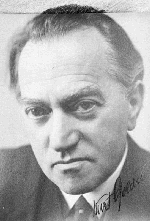Dr. Kurt Goldstein
(1878-1965)
|
Goldstein of German origin, was a great neuroanatomist and clinician. He charted the cause of the lateral spino thalamic trait to its termination. He studied in the great French School of Georges Marinesco (1864-1938) and was also an important contemporary of Constantin von Monakow (1853-1930). He demonstrated the phylogenetic development of the diencephalon. He also advanced the empirically founded theory of neurology. |
In the course of his studies of brain-damaged soldiers during World War I, Goldstein became aware of the inability of contemporary biology and medicine to explain both the impact of such injuries and the astonishing adjustments that patients made to them. He began to challenge atomistic approaches that dealt with "localized" symptoms, insisting instead that an organisim must be analyzed in terms of the totality of its behavior and interaction with its surrounding milieu. Goldstein was especially concerned with the breakdown of organization and the failure of central controls that take place in catastrophic responses to situations such as physical or mental illness. But he was equally attuned to the amazing powers of the organism to readjust to such catastrophic losses, if only by withdrawal to a more limited range which it could manage by a redistribution of its reduced energies, thus reclaiming as much wholeness as new circumstances allowed. Goldstein's theses in The Organism have had an important impact on philosophical and psychological thought throughout this century, as can be seen in the work of Maurice Merleau-Ponty, Georges Canguilhem, Ernst Cassirer, and Ludwig Binswanger. In the words of Oliver Sacks: "All that Goldstein observed and brooded over -- levels of organization of the nervous system, health, disease, adaptation, reconstruction -- has once again come to the fore, with the advent of new conceptual and technical tools to approach these. The global theory that Goldstein and Lashley and the Gestaltists sought may now have emerged in Edelman's theory of neural Darwinism and his concept of the brain as a sort of society, in which every part is dynamically connected with every other."
|
|




























